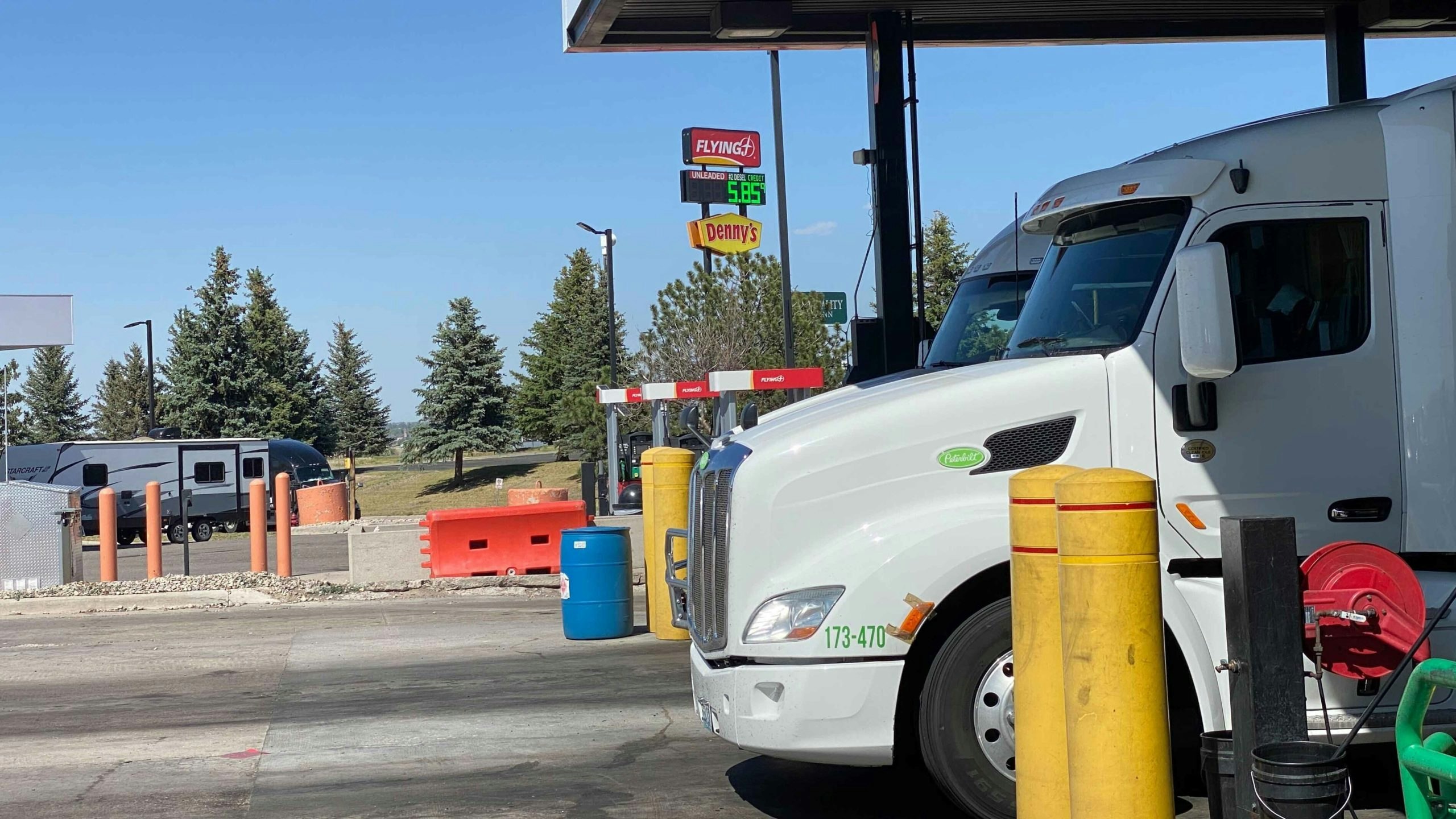By Clair McFarland, Cowboy State Daily
clair@cowboystatedaily.com
High fuel prices are forcing an increase in the cost of all other goods in the West, which could lead to a decline in consumer demands for products, Wyoming truckers warned this week.
The national average diesel price on Monday hit nearly $5.72 per gallon – an increase of more than two dollars from last June, when the national average was $3.29.
The increase has a ripple effect with nearly every other tangible product, said Kim Barr, part-owner of Rolling Hills Trucking in Worland, adding that despite 30 years of working in transport, he’s never seen fuel costs climb by this magnitude.
“It’s kind of getting ridiculous,” he said.
Trucking companies’ survivalist responses to the fuel hike are nearly universal, said Barr: they’re adding or increasing fuel surcharges.
But many of the companies also have increased their per-mile rate to cover the cost of truck parts, some of which have doubled since fuel prices skyrocketed in recent months.
A semi-truck tire that once cost $200 sells for $400 now.
Before last year, mileage rates were increased annually.
“Lately, they go up weekly,” said Barr.
So far, the surcharges haven’t diminished Barr’s consumer base, he said, adding that he knows consumers are feeling the pinch nevertheless.
“People still use us, because they’re going to pay anyway – it sounds like the majority of trucks out there are doing the same thing. And if not, they’re not going to be around very long,” said Barr. “No one’s getting rich… But everyone’s kind of breaking even, if they’re doing it right.”
Running 11 trucks, Rolling Hills hauls mostly Sheetrock plus lumber and other building products.
There are some pockets in Wyoming where distribution centers have shut down intermittently, said Barr, due to complications stemming from rising freight costs.
In more essential markets like the grocery store, “whatever costs you there has gone up because it’s costing them in fuel to get it there,” said Barr.
Budgets Tighten
Kelly Eckhardt of Kelly Eckhardt Transport in Lander, hauls everything from hay to livestock and magnesium chloride for dust control on dirt roads and work sites.
Running eight trucks through several Western states, Eckhardt’s fuel costs have an impact on governmental road maintenance budgets, the agricultural community, the energy sector and the grocery industry.
Although his consumer base diminished slightly this year as some ranchers have changed the way they transport livestock to counter rising prices, Eckhardt said he’s still “extremely busy.”
That could change next year, as county and other governments may adjust their budgets to use less magnesium chloride in light of the freight costs.
“Right now we can kind of sustain (the prices) but if it goes much higher, I just don’t know how people can still afford to pay us to do this,” said Eckhardt. “It’s increased the cost of everything.”
To fill a truck recently at $5.44 a gallon in Utah cost Eckhardt nearly $1400, he said.
Where Are The Workers?
As they struggle with the continuing increases in fuel costs, Eckhardt and Barr are also facing a second industry challenge that they couldn’t explain fully: the worker shortage.
Barr hasn’t pulled any trucks off the road due to fuel costs but has parked two of them due to a driver shortage, the cause of which he called “the million dollar question.”
“People either don’t want to drive truck or don’t want to work, or a lot of them don’t like the new regulations with (electric logging devices),” he said.
The federal government had mandated that by 2019, commercial trucks must install the ELD devices, which rigorously track movement and location data, replacing paper logs now kept by drivers.
ELD data is accessible by law enforcement and department of transportation officials.
“I can’t find drivers like I used to,” said Eckhardt, who suspected a cultural decline in work ethic.
“‘Nobody wants to work anymore,’ is kind of our saying now. They’ve lost the enthusiasm to work and try to get ahead,” said Eckhardt, who has parked three trucks due to the driver shortage.
He noted that he’s increased wage offerings to combat the problem.
“We try to keep (wages) as high as we can, but I don’t think it’s going to be sustainable,” he said, citing the difficulty of maintaining profit margins with the high fuel costs.
People will always need material goods, said Eckhardt. But amid prolonged high fuel prices, he added, the country could see a collapse in demand with resulting negative impacts on the economy.
“If the recession hits I think a lot of this (product delivery) is going to come to a screeching halt.”





